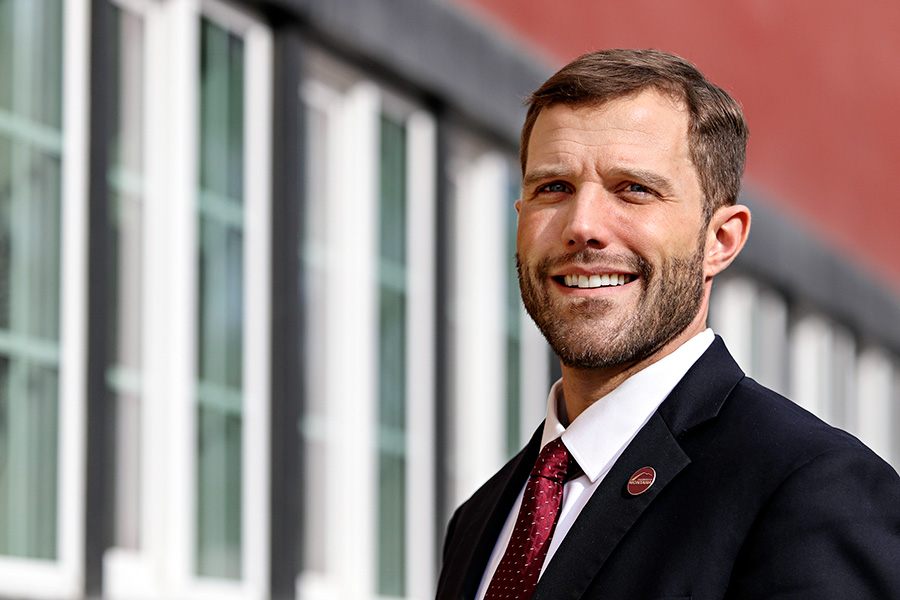Seth Bodnar, who took the reins as president of the University of Montana in January, sees a world that increasingly values people with diverse, interdisciplinary educations and employment capabilities.
His own experience speaks to this assessment: graduate of West Point, “a liberal arts college with a bunch of military training;” Rhodes and Truman scholar who earned two master’s degrees from the University of Oxford; platoon leader in the 101st Airborne Division in Iraq; Green Beret who lived in a grass hut in the Philippine jungles; senior executive for General Electric; assistant professor of economics.
Not much in his resume seems to specifically suggest preparation to run a university in Montana, but, then again, maybe a lot does.
“The education that I received, an education I think UM gives people, is exactly the type of education (people need today),” Bodnar said during an April 19 interview, citing the university’s well-documented reputation in arts and humanities and sometimes lesser-known accolades in science, technology and professional schools, such as law, business and pharmacy.
“We have this really great mix of offerings,” he said. “The strength of UM is in the ‘and’ … the ability to equip students with a broad-based, interdisciplinary, core education that regardless of their chosen major or discipline is going to prepare them to adapt over the course of their career.”
To further illustrate his point, Bodnar likes to tell the story of Eric Sprunk, chief operating officer for Nike and a UM alumnus who is delivering the school’s commencement speech on May 12. Sprunk told Bodnar he valued his accounting studies, “but it was that UM education that actually enabled me to grow and rise through Nike.”
“And he’s basically leading one of the most influential and impactful companies in the world,” Bodnar said. “I hear stories like that again and again and again. I think that’s a terrific asset of the university, and we’re going to enhance it.”
Bodnar stopped by the Beacon offices last week to discuss his vision for the University of Montana, which has been plagued by declining enrollment for nearly a decade, accompanied by a financial crisis. In addition to recruitment troubles, he also acknowledged the school’s low retainment rate. Taking the helm at only 38 years old, Bodnar is trying to prove he’s the person to right the ship.
One catalyst of those problems is the school’s long-running public reckoning with sexual assault allegations, including high-profile cases involving football players, and criticism over its handling of the allegations, all of which led to a U.S. Department of Justice investigation and a Jon Krakauer released book in 2015 called “Missoula: Rape and the Justice System in a College Town.”
The university strengthened its response procedures to sexual assault allegations on campus, and former U.S. Attorney Michael Cotter called the overhauled policies the “gold standard” for other schools to emulate.
While Bodnar wasn’t involved with the university through those years, he inherits the fallout, including the challenge of rebuilding the school’s public image. He says his goal is to find better ways to tell the story of a university that ultimately has a good story to tell. Right now, however, part of that story is financial trouble.
The university, facing a $10 million deficit, released a “Strategy for Distinction” last week that aims to address the shortfall. Among the preliminary recommendations is eliminating 50 faculty members over three years as part of an effort cut the deficit in half. The university is currently seeking feedback on the draft proposal.
In his message accompanying the document, Bodnar said: “We aspire to educate agile, lifelong learners prepared to solve complex interdisciplinary challenges … We contribute to the economic prosperity and societal quality of life for our region, our state, and well beyond.”
“And yet, we have not been clear or focused enough about UM’s special strengths or the relevance and value of a UM education,” Bodnar continued. “The path we are currently on is unsustainable.”
Alluding to the statement about the school not clarifying a message about its strengths and relevance, Bodnar mentioned in his interview that while many people are aware of the university’s humanities and arts accolades, not as many know of its reputed science and technology offerings.
“That’s one of those perceptions we need to adjust a little bit,” he said.
Bodnar referenced Clarivate Analytics’ recent report called “The World’s Most Influential Scientific Minds,” and pointed out that all three of Montana’s representatives are affiliated with UM. He added that the school has “North America’s number one” wildlife biology program, as well as the “world’s most productive researchers in the field of ecology.” He also said UM students have a high acceptance rate into medical school.
Among the university’s proposed cuts are six full-time equivalent positions in English and 7.5 in classical languages and literature, which has prompted representatives from those departments to publicly voice concern. The Missoulian recently quoted professors in the school’s creative writing program, which is considered among the nation’s finest, as saying the department’s future is uncertain.
Bodnar’s draft proposal also calls for reorganizing and consolidating departments and administrative structures, such as reducing the number of department heads in the College of Humanities and Sciences from 23 to 10. It also updated its mission statement to reflect Bodnar’s vision for the future.
“What we need to do is make sure, yes, we give you the skills to get your first job, but we also equip you with the education to succeed in your sixth, your seventh, your eighth job,” Bodnar said. “UM does that really, really well, and that’s one of the things we’re focused on moving forward.”
